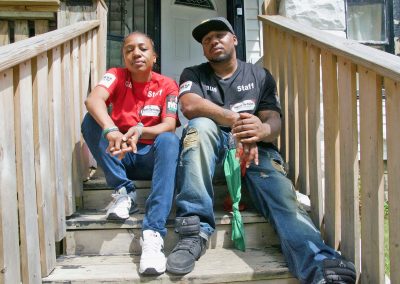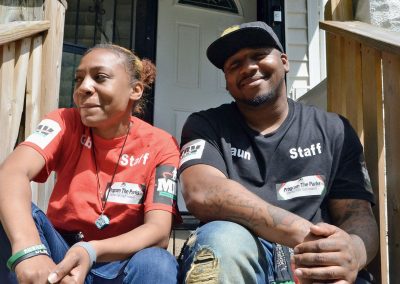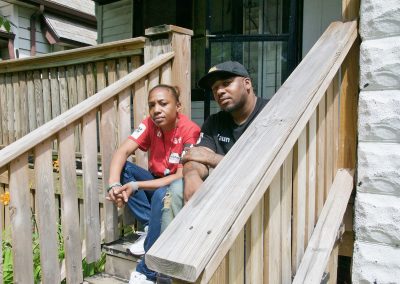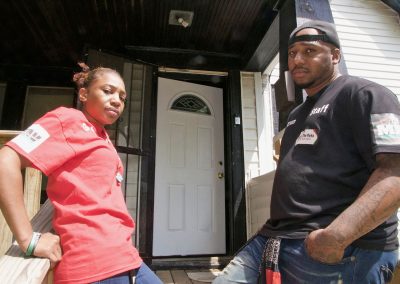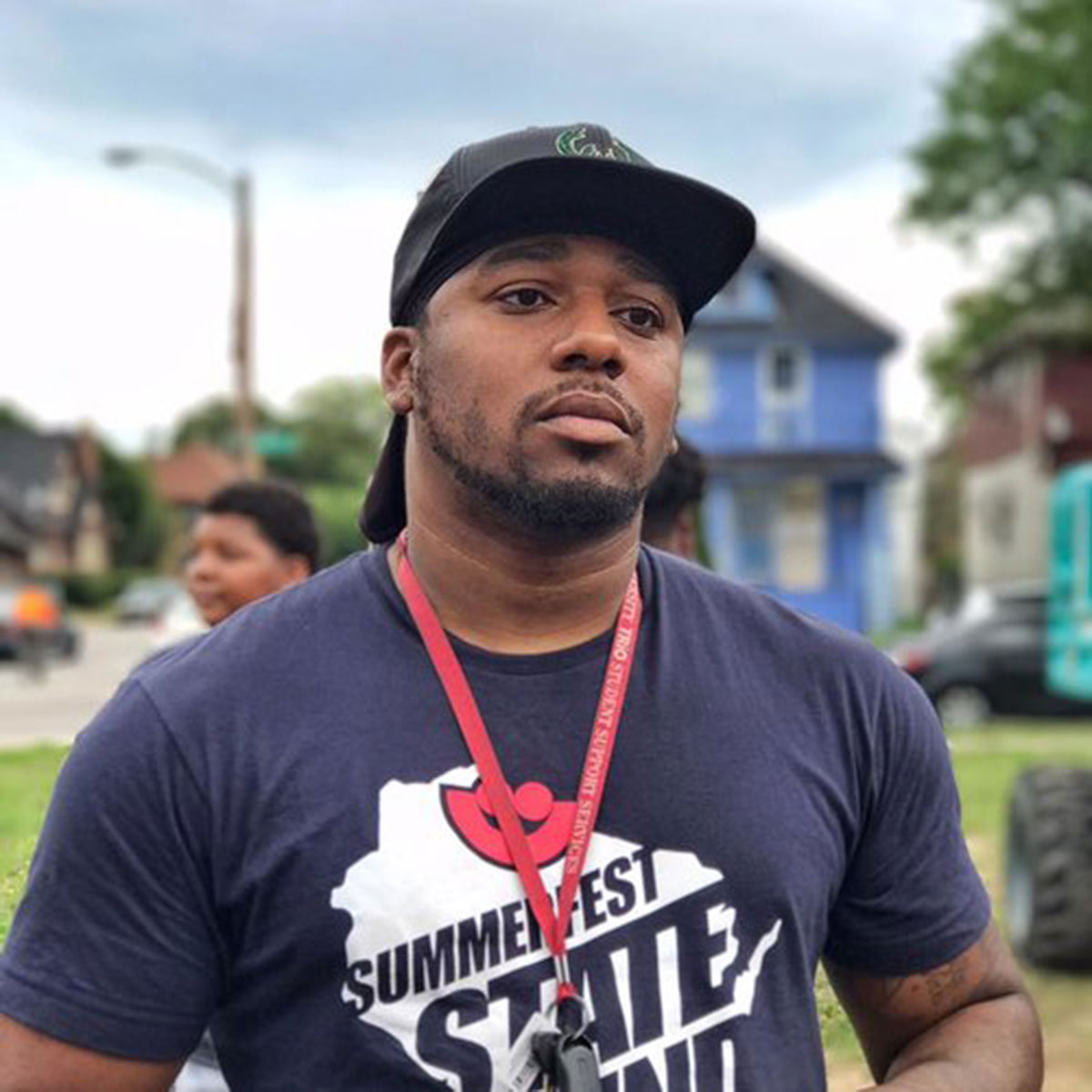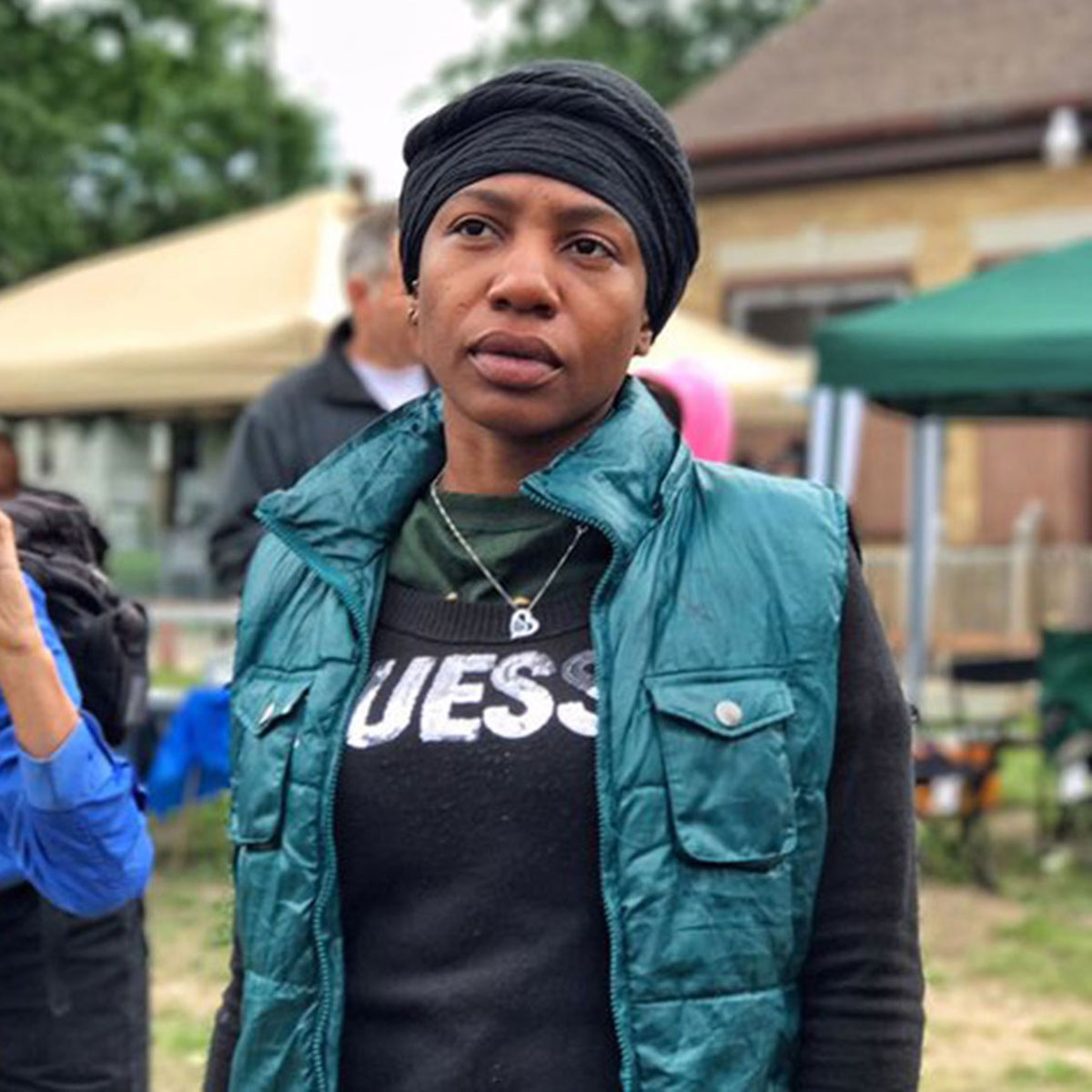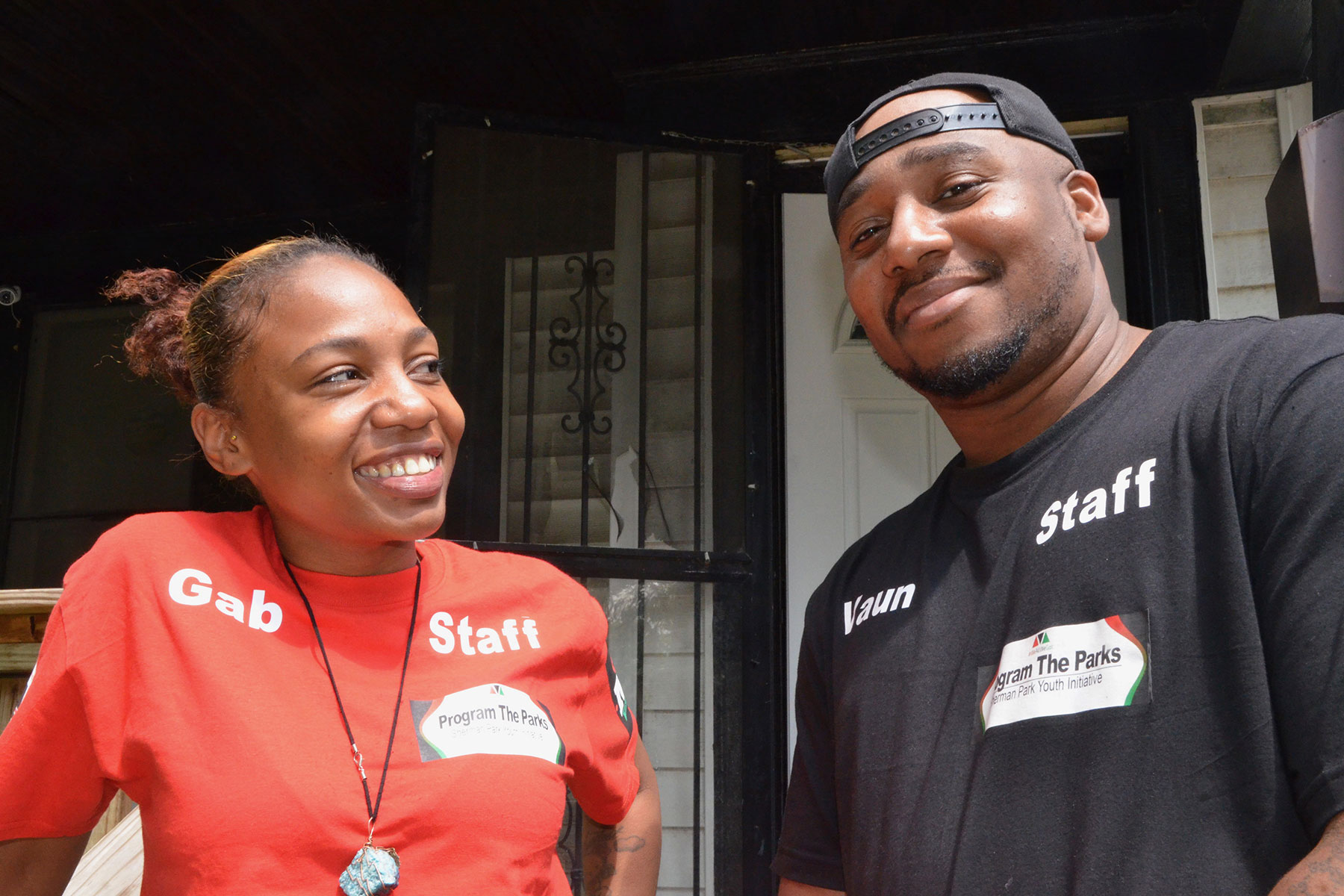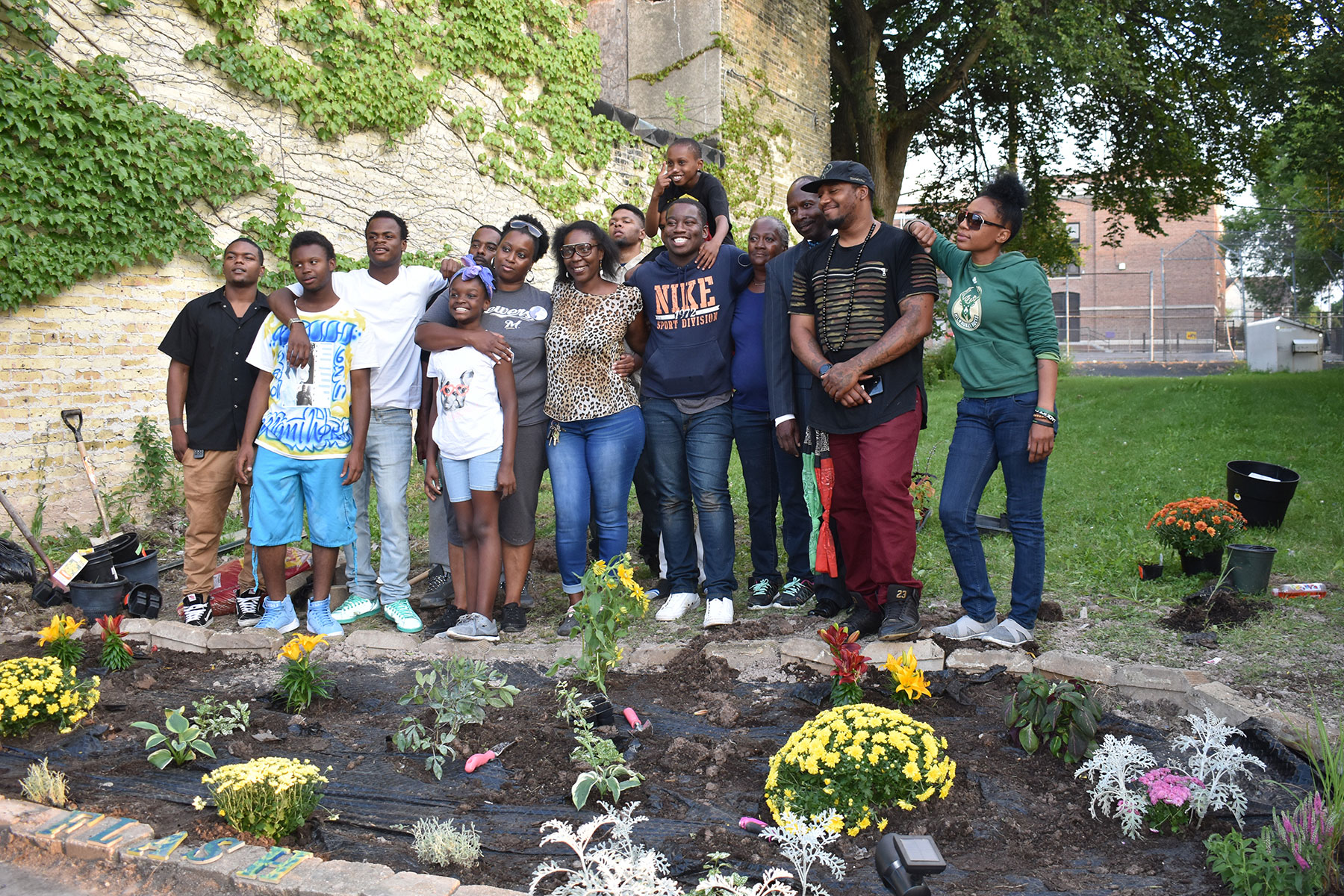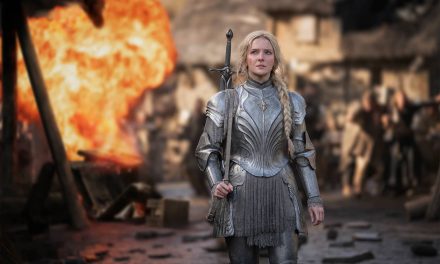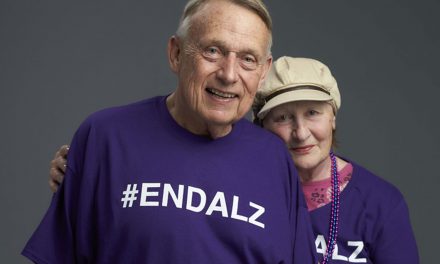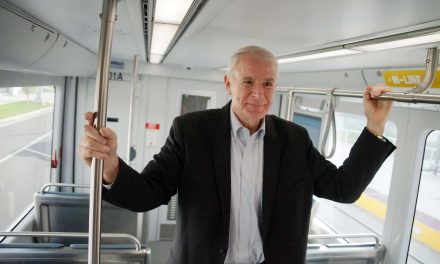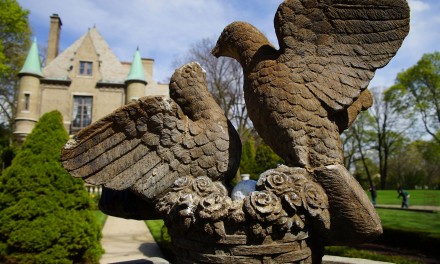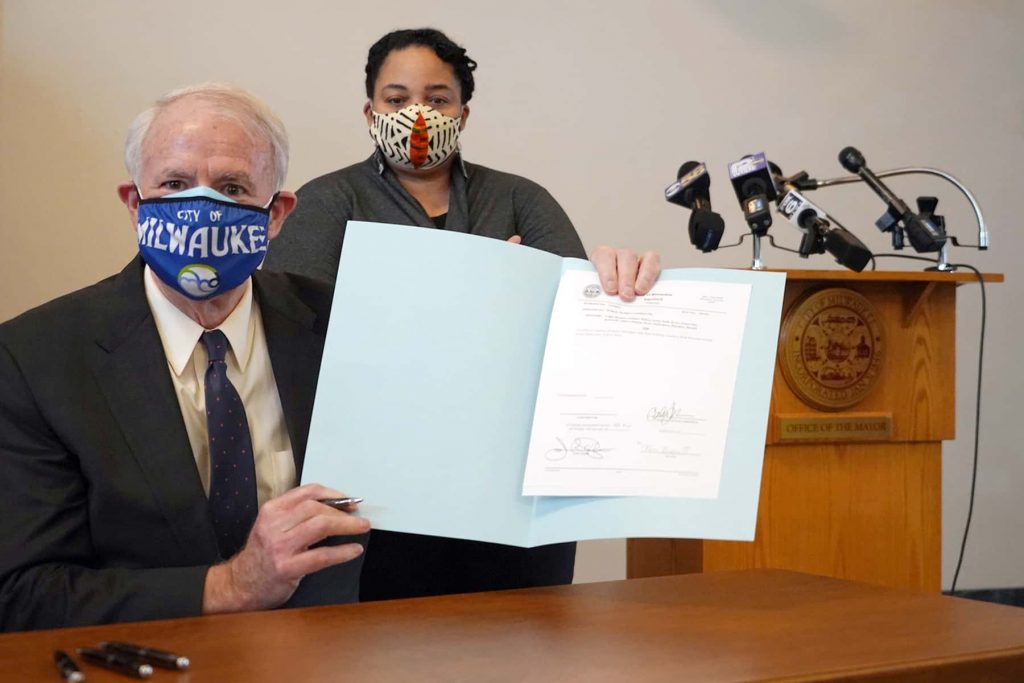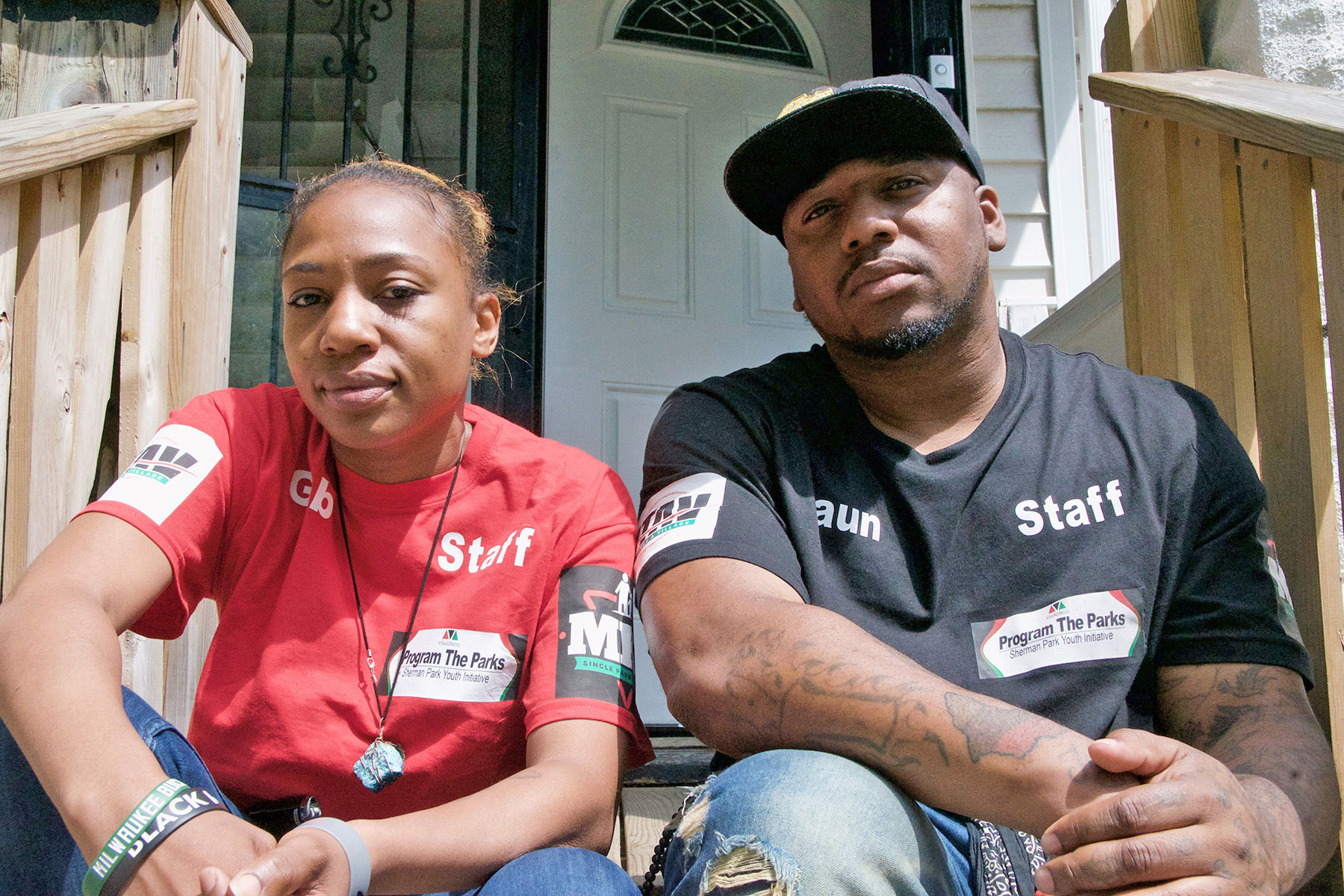
Since March, I have been exploring the nature of walking as a practice, as a way to slow down and interact with one’s environment, as a strategy for uncovering at the street level a city’s assets and challenges, and as an integral part of street photography. The impetus behind these explorations has been my two-year photographic journey with ZIP MKE and my recent work with Jane’s Walk MKE. I also began zooming in to focus on the impact of neglecting or even forgetting public spaces like MacArthur Square and Butterfly Park instead of seeking ways to reactivate them.
However, when Vaun Mayes, a powerful advocate of one such space, Sherman Park, was charged on July 2, 2018, with planning to firebomb a Milwaukee police station after the unrest in the park two Augusts ago, I decided to take a step back and share a heretofore unpublished interview I conducted with Mayes and Gab Taylor, who co-founded Program the Parks (PTP) and It Takes a Village: Community Empowerment & Solutions Center (ITAV).
While Mayes began patrolling Sherman Park solo in June 2016, as he had in different parts of the city, both Mayes and Taylor have almost single-handedly run PTP since that summer and, more recently, have begun a connected, indoor program called ITAV. These two programs intervene in the lives of hundreds of area youth, whether by preventing or de-escalating fights even when the police force can’t or providing food and school supplies to those in need, or by mentoring them, transporting them, or filling in educational gaps with reading, science, and the arts, including photography and music production. Their mission to help the community of Sherman Park is non-stop.
In reality, this interview is not so much a step back as it is a further zoom, because I believe that neighborhood exploration and photographic representation lose value if a tour happens and no one returns or if a relationship with the people and institutions behind the photos is never fostered. I first met Vaun and Gab while visiting Coffee Makes You Black for the first time, hoping to represent for ZIP MKE residents who lived in the 53206 ZIP Code. Since then, in full disclosure, I have assisted their efforts with PTP and ITAV in ways that are shamefully insufficient. So in order to help foster my relationship with Vaun and Gab, who model for me authentic grassroots activism, I sat down with them several times this past winter to construct a more complete portrait of their lives, beyond what news stories are able to (or choose to) relate.
I asked them about their childhoods and educations, learned about faith and survival, and gained a better idea of what in their past lives has fueled their tireless action. As an interviewer, it was an exhausting yet still inexhaustive journey into the lives of these two individuals. But as Vaun awaits trial, the community needs to know that his story, Gab’s story, and the story of Sherman Park are not complete.
An interview with Vaun Mayes and Gab Taylor
ON INQUIRY & SELF-EDUCATION
VAUN: I was born in Milwaukee’s inner city, in 53206. But when I was four I was sent to Mississippi to live with my great uncle. I remember my mom just putting me in the car and driving me down there. I had never met this uncle or his wife or his son. I remember waking up the next day and my mom was gone. I thought maybe she went to the store or something and she was coming back, but then days turned into weeks and I’m still like, “What the hell’s going on here?
However, my uncle was a very decent man. He worked for the FAA and owned a car lot, so we lived pretty decently down there. Even though he and his wife weren’t Catholic, he sent us to private Catholic schools all the way up until about seventh grade. They were also very churchy people, like seven days of the week churchy. And Greenwood, Mississippi, was a lot more stable than Milwaukee had been. It’s near Mississippi State University, not too country, not too big city, so it was kind of perfect. Actually, it was the best places I’ve ever lived.
However, I was different from everybody else. Down south they got more darker skin people with southern accents. I spoke “proper” to everybody and had lighter skin, so I got picked on a lot. On top of that, our town was segregated like it is here in Milwaukee, but not between Black and white. There it was “have” and “have nots.” And because my uncle was very successful, we moved from the poorer Glendale Circle neighborhood to Birdland, where all the streets are named after birds and it’s separated by a ditch from the poor side. My peers were like, “Oh, you think you better than everybody else.” But even when they jumped me, I didn’t fight back because I knew I’d get in more trouble at home. It was like that between maybe 3rd grade and 8th grade. I’d just try to get away.
Unfortunately, my uncle’s wife didn’t like me either. She went out of her way to discipline me, picking on me to the extreme. She would whoop me whenever he wasn’t there. And because he worked all the time, there wasn’t much he could do about it.
So I’d escape from my peers and my uncle’s wife by teaching myself. Because even though in Mississippi I went to nice private schools, they wouldn’t really teach us. They would just hand us a packet and just say, “Do this.” So I had to teach myself the reading, the math. Every summer, too, I would go to the library and read all kinds of things, especially science. I would go out in the backyard, lift up the logs, play with the bugs, then go read about geography and the most dangerous animals, that kind of stuff. When I got older and I got access to computers, I would read dictionaries all the time.That’s something I did from like 4th and 5th grade up. Like I would literally read the dictionary. I always liked words and spelling and writing.
I think what really changed me was watching Eyes on the Prize and Malcolm X. I do the work with youth that I do now because if Martin Luther King Jr. had his eyes on the prize, so should I. And I began gravitating toward researching law and the meanings of words, because Malcolm X really showed how he began questioning why things were they were, especially for black men. And while he was in prison, he educated himself, reading even after lights out, and became who he was. That’s when I started thinking that I could question, learn, and then take action. I didn’t need to go to prison to change my thinking and follow the same path, though.
* * *
GAB: I grew up in Chicago, where my mother and older brother and sister lived with my aunt and uncle. Growing up on Chicago’s south side was a struggle, but I was too young to know, because we always had someplace to stay. We had times when we didn’t have enough food, but I just wasn’t aware of our hardship. Like I didn’t see any of the violence in Chicago. I heard about it, but it was all very not of this world to me. I never thought about how “so and so got shot in the hallway last night.”
When I was nine, we moved to Milwaukee, without my dad. I didn’t even find out until I was 16 he didn’t know that we left, like he was looking for us for years. The state cut my mom’s welfare, so they started inquiring about child support – and that’s how he found out where we were. I felt bad that I didn’t get to know him. I was like, Why didn’t my mom ever tell me? She just kind of kept all that quiet. And she had another boyfriend.
Early on, when I was three, I remember watching Star Trek Next Generation and Star Trek Voyager with my uncle every night before I went to bed. That’s where I got my passion for the universe, the metaphysical, the abstract. I was more interested in space than earth and people, like I wanted to know why oxygen was oxygen, why was the stars in the sky, why do we breathe, stuff like that.
Later, I would get a new telescope every Christmas from age 8 to 14, when the gifts stopped coming. They was like shitty telescopes, though, so I could only see the moon, you know? But, we had a back porch and balcony, and I would always be on there, every night as soon as it got dark, whenever I could. I would look in the sky, and just wonder. When people would ask me what I wanted to be when I grew up, I always said, “An astronomer.” Unfortunately, I didn’t have any access to books about the universe. So I couldn’t wait to get to school to learn more about life. But then I got to school and they told me nothing about why we’re here.
I also had questions, though, about real life: why we were poor, why I felt like Black was wrong. I didn’t understand none of that, so I thought if I got the bigger answers to what life is – what is water, what is air, and why, why, why – then I would understand everything else that was going on. I didn’t understand why everybody else seemed to be going with the flow. On TV shows like Full House, everybody’s life seemed perfect. Even The Cosby Show felt so unrealistic because my life wasn’t like that.
ON LOSING FAITH & LEARNING TO SURVIVE
VAUN: By the time my uncle and his wife got a divorce when I was 13, I had also become a hardcore atheist. I would try praying, but nothing happened. So my faith started dying. I started to believe that nothing changes until you make the change. I just believe that people should go through life and try to make their good outweigh their bad, and that’s all that you can expect from a human. Because nobody is perfect.
One of the first things I did after my uncle’s wife was gone was make a list of everybody who had picked on me. I was up to no good, but I felt free. I went to school, caught these boys one by one, and fought them, which got me suspended many times. I was able to hide this from my uncle for a long time, until the day the school called him after one of my fights. He found out, and that was that: “Maybe it’s about time that you go back up there, because down here, the way stuff works, you’re going to get killed or you will kill somebody.” The next day, my uncle had my suitcases ready and I was on a train back to Milwaukee. I was 14.
I lived with my mother and my aunt. (My dad had pretty much been going back and forth to prison because he got involved in street stuff.) However, my mom left us after a big fight with my aunt, who then expected me to pay my own way for staying there. Because her boyfriend was a drug dealer, he taught me how to sell drugs, handed me my first blunt, my first gun. He began teaching me how to live and get by in Milwaukee.
When I got caught with a gun, however, I spent thirty days in jail, then house arrest. I thought about how we grow up being taught that if a person is older than you, you’re just supposed to do what they say. But I didn’t want to do what my aunt and her boyfriend were telling me to do. I was given that chance when, in the middle of one of their epic fights with pots and pans and fists, one of them screamed for me to leave.
So now it was just me out there on the north side. I connected with a guy I called “my brother” – a family friend, car thief, and rapper – and some other guys he knew, mostly older. We put together a little rap group that was actually a gang of about ten or twelve. Everyone respected that I was a good fighter, even at only 15. I was proud of being the person who provided the structure and family for the gang. And I had very strict rules for them: no hurting kids or women, no killing. But we were definitely happy to fight, especially with the east side gangs.
Oddly enough, I stayed in school with the encouragement and support of my grandmother. Even though I got kicked out of public school for, you guessed it, fighting, I went to a temporary alternative school, where I was a 4.0 student. But I was on and off probation during this time. When I was 18 and caught my last case – and was tried as an adult – I broke off from street stuff completely because it wouldn’t be little kid cases anymore. My parole officer told me that if I graduated from high school, they would waive my probation fees. So I graduated.
My early twenties saw me living back in Mississippi with my uncle for a year, helping him on the car lot, then with my mom again, when I became a construction supervisor. Even with these opportunities, one thing led to another and I stopped reporting to my PO, which got me even more probation. On top of that, I had my first children, but went to prison for a little bit shortly after my second was born. While in prison, I lost my house and car and my kids and their mom moved to North Carolina. And when I got out, I absconded again to be with be with them – which got me even more probation. Things just weren’t working out.
* * *
GAB: I had always been a “good kid,” meaning I was extremely shy and didn’t get in trouble. But after we moved to Milwaukee, that’s when the whuppings started happening to me, too, and not just my brother and sister. When our mom would come home, it was dead silent. We couldn’t do nothing – no talking at dinner time, no opening the refrigerator, no asking for anything. If we did, she’d holler and beat us. So at school, I only raised my hand and answered questions. It’s not that I couldn’t talk, it’s just that I chose not to. That was a sign of abuse that nobody picked up on.
Despite the abuse, I did real good in school. I even attended a school for the gifted and talented. But socially, I was done. I didn’t know how to interact with people. But then my grades started falling off around 7th grade. The school was good, but they didn’t have what kids like me needed back then. They didn’t deal with the effects of abuse unless you came to school with a black eye or something.
During all this, my stepfather had us going to church. I’m like, oh yes, I’m going to finally get some answers. So, he gave us the Bible to read and the first book I read was Revelations. I was like, “Oh, shit.” You know? I didn’t get any answers there, so there I go, back inside my shell again.
I stopped asking big questions. At this point, the only question that mattered was “What’s going to happen at home?” But every night, I would still pray faithfully. I’d be on my knees like, “Please forgive me.” But even that wasn’t working. I was still being beat. I still didn’t have any answers. Praying wasn’t working, or school or home or friends. So, what the hell was going on? What was I missing?”
It wasn’t until high school when one of the guidance counselors asked me, “What’s wrong with you? You are smart as hell, but you’re not like this. I wish I could take you home with me.” And I said, “Yeah, I wish you could, too.” But reality was different: my brother started selling drugs at 15, then my sister, then me. My brother went on to spend time in juvenile detention, then adult jail. I dropped out of high school in the 10th grade, got pregnant with my daughter the first time I had sex when I was 15, got put in foster when I was 17, lived in a shelter when I was 18, gave birth to my son at 18, too, then got put into transitional living for a year. At this point, I was still looking for somebody to take care of me, help me. I was a still just a kid.
I was able to stay with my mother for a couple of months, but that was hell. After one freezing January night when she left us out in the cold with my three-year-old daughter and my baby boy, I connected with a community help worker who convinced me to put my children in temporary foster care. My mother took them, but in the final stages of adoption only wanted to adopt my son. Her doctor intervened and she was deemed unfit to adopt, so another family adopted them.
Once I came to terms with not being able to get my children back, I wanted to something with my life – now. I didn’t want to become even more of a statistic. So I finally decided to get my GED and get my own place and a job as a caregiver, which lasted for seven years. But even with all that, the darkness was still there: I still smoked a lot of weed and even attempted suicide a couple of times. Something about being a caregiver, however, helped me survive. I knew that at least I wasn’t the kind of person who was going to be like my mother, an abuser, someone who didn’t care about other people.
ON ACTIVISM & TAKING A STAND
VAUN: After Trayvon Martin was killed in 2012, I was on a bus near Martin Luther King Drive and saw a protest down the street. “Stop the bus!” I said. “This is something I’ve never seen: a real protest. This is something I can do, you know?” I would go on to join the Occupy the Hood movement protesting the killing of Dontre Hamilton in 2014 and started getting involved in more community issues.
But Malcolm X was always in the back of my head and I started thinking that chanting was good but it didn’t seem like enough. I wanted to start doing some gradually extreme stuff.
Sometimes we had crowds of 300 or 400 and made big speeches. It was really, really dope, like real direct action that was riling people up. Some of our group got arrested. But even that, eventually, didn’t seem to matter. All people wanted to do was yell.
So I started to organize my own things like community patrols and helping people with legal cases, more hands-on work where I could actually help people combat what was being done to us. I patrolled different areas myself, breaking up fights, assisting youth in need, confronting police officers. I’d record everything and put it up on Facebook. There’d be tons of views and shares, and lots of words of support, but unfortunately, I found that people only like to talk about the problems instead of doing the work to solve them.
It was after I went to Baltimore in 2015 after Freddie Gray was killed and I took a viral video of Erica Walker protesting while standing on the American flag in front of the National Guard. This resonated with me. So I started doing it myself – in Flint, in Madison, in Chicago, at election rallies – and my videos went viral. I was known as “the flag dude” and even ended up on Fox News with Bill O’Reilly. It was never really about the actual flag but the hypocrisy of what we say it stands for and what actually happens to people. A lot of times you have to do something seen as extreme to get people to really listen, you know, to get them thinking.
My personal activism and ideology has nothing to do with the community work I do now. They are two totally separate things. This is important, because when Gab and I started youth programming in Sherman Park, people still associated me with my flag protests. But I don’t need to – and won’t – stand on a flag in the middle of Sherman Park because now I’m doing the action part of it. I’m policing my community so that the police don’t even need to be here. That’s exactly what I was trying to bring attention to when I stood on the flag. We need to do our part and take action.
* * *
GAB: Even though we knew of each other through other avenues, Vaun and I didn’t connect until we found each other on Facebook. He was challenging injustices and was on the news for stepping on flags, but I had been conditioned to not challenge the system. But I sent him my number, wanting to find out why he was doing these things. When he called me, I was surprised to find out that he was compassionate, genuine, and caring. He resonated with my spirit. I still didn’t think I could do the things he was doing to combat racism, but I told him I’d keep following his efforts.
What I noticed, however, was that hundreds of people would message him with things like “Yeah, bro! We going to come to you!” But then nobody would actually join him. So I finally gave him a ride to a protest downtown, and sure enough, I was the only other person there. Still, he got out his flag and lay it out. I’m thinking, “I am not standing on that.” But then came all these white people asking us why we thought this was okay. As Vaun answered them, articulately, I realized that he really believed in what he was doing – and that he was doing it along – so I started inching closer and closer, stepping on the flag. I wasn’t going to leave him alone.
When he asked me for help to break up a fight in Sherman Park in June 2016, I did. A mass of kids with bats, tasers, and knives were fighting. I started grabbing weapons and all of a sudden yelled, “What the hell? Everybody stop!” Even Vaun didn’t expect it. It just came out of me naturally. Vaun saw something in me that I didn’t even recognize in myself, so Vaun encouraged me to start working with these kids. That was the start of our work together. From then on, it was always me and him, working with kids in the park, every single day. We called it Program the Parks.
ON BUILDING TRUST & WRITING HISTORY
VAUN & GAB: When we first started Program the Parks, we still did a lot of intervention but also more positive mentorship for the youth in the Sherman Park neighborhood. We talked to them to see how they felt and what their mindsets were, allowing them the chance to express why they might be doing some of the negative things they were doing. Other people like the police or other adults hadn’t been very successful with them because they came in as “The Authority.”
We began by literally circling the kids, walking around the tot lot where many of them gathered, making sure we could see them in their element and that they saw us, too. We saw them just being kids, in their true form instead of the mob mentality stuff. Fifteen-year-olds up to like 22, all playing tag, roughhousing and running, some dancing. We listened to what they were saying: “Why are they up here? They come here every day?” You know, we were new to their territory, and they were testing us out: were we undercover police?
It took a little time for them to build up a trust and respect for us, but when we offered our protection to them, eventually they would warn us if they knew something was about to happen. If you’re an adult and you allow something bad to happen to them, especially when you know it’s going to happen, kids distrust and lose their trust in you. They trusted us, though. However, when we weren’t there, sometimes there would be clashes between the kids and the police. When you have so many kids packed into a little space in the park, kids who have nothing and have nothing to do, that’s what happens, especially with teenagers who are impulsive and feel so much peer pressure. We realized that we were making a difference – because when we were there, things like that didn’t happen–and that we needed to be there every day.
By August 2016, we had a daily schedule down pat: we made sure they all got food so they wouldn’t have to steal from the stores. We brought music because we saw they liked to dance. We offered other activities. We had to answer the same questions every day: “Why are you still coming here? You all really care about us for real? Who’s paying for all this stuff?”
One day we had one of our community cookouts. After the park closed at 10 p.m., we were ushering kids out, when a gas station employee from across the street fired his shotgun in the air to disperse a large group of kids who had recently gathered inside his store. A crowd of kids scattered, other kids and community members started to gather, the police came. Some families were like “We’re fixing to tear this place up.” But we shut the gas station down and told everyone, “No. We’re going to take care of this.” A few days later, we were able to get the owner to agree to fire the clerk and help out Program the Parks with food for our daily programming if we helped make sure the kids followed the two-people-at-a-time policy and didn’t steal.
About an hour later, Sylville Smith was shot by a police officer. After the police were gone, people were amped up, asking, “What are we going to do next?” Someone actually said, “Well, the gas station got to go.” We can handle 200 kids in the park, but when you got grown people, who knows? People came from all over–we didn’t know any of them. Some were armed. A police car was set on fire, so now the fire trucks were there and we were trying to divert traffic and move people away so no one got hurt. And then the gas station was set on fire, then the bank and other businesses.
People think they that the only reason everything happened was that Sylville was killed, but it was so much bigger than that. They think it was the kids from Sherman Park, but it wasn’t. We’ve been trying since the beginning to correct the media narrative of that night because we were there. But still, the sheriff issued a new 6 o’clock curfew on the park and had an orange fence put up around the perimeter. Not many kids came back for awhile. It was sad because now we didn’t know where these kids were. We couldn’t watch them.
The county eventually got the fence taken down and the curfew gradually got pushed back to 10 p.m. We returned to the park that we had we had been to for months already. But even though we kept coming back, our programs never got covered in the media. Lots of other efforts from communities outside Sherman Park got covered, but not ours. They were rewriting history and writing us out. And putting our kids in a bad light.
But that didn’t stop us.
We kept providing youth and adults things they needed for school and their households.
We kept making sure the kids had food to eat.
We kept cleaning the park together.
We kept trying to keep the park safe, then created an indoor space – ITAV – as an extra space for youth to chill, decompress, learn, and be safe.
We have rec room, a Cultural Community Library, a sound booth, screen printing presses, and more.
And we’re empowering youth ambassadors who can model positive actions for the littler kids. The ambassadors help us mediate conflicts among the other youth.
The ultimate goal is for us to just sit back and watch them take initiative. Pretty dope, you know what we’re saying?
© Photo
Dominic Inouye, Scottie Lee Meyers, and Nick Hansen

